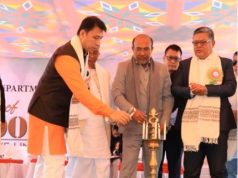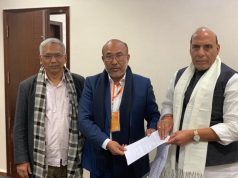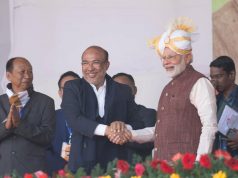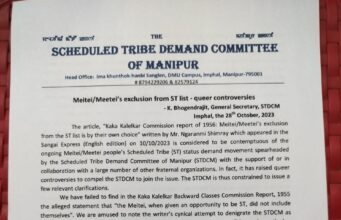Imphal, the 11th September, 2017 (DIPR): Under the Saakshar Bharat (Literate India ) Programme, 321 Adult Education Centres (AECs) are implemented in four districts of the State. The districts are Chandel, Senapati, Tamenglong and Thoubal since January 2010. Out of 321 AECs, 20 AECs have been upgraded to the level of MODEL AECs with the financial assistance from CONCOR ( Container Corporation of India Limited).
The programme is implemented through Adult Education Centres (AECs) which is set up in every Gram Panchayat level. An Adult Education Centre acts as a Centre for imparting basic literacy to illiterate adults and Basic Education to enable them to continue their learning beyond Basic Literacy ; Centre for thematic courses on behalf of other department such as Agriculture, Animal Husbandry, Health, Education, Rural Developmentt, Women & Child Development, SCs, STs, OBC welfare, Panchayati Raj, Science & Technology etc. based on local demand; Library & reading room; Venue for group discussion; Vocational & Skill development and extension facility for other departments; Centre for promoting sports, recreational & cultural activities and composite information windows for the programmes taken by other departments from time to time.
The district wise breakup of the Model and Sanctioned AECs are Thoubal 5 & 64, Chandel 5 &59, Senapati 5 &142 and Tamenglong 5 & 56 respectively.
The Saakshar Bhart is a centrally Sponsored Scheme Of Department of School Education and Literacy (DSEL), Ministry of Human Resource Development Government of India launched by the Prime Minister of India on 8th September, 2009.
It is worth to mention that the programme has been devised with innovative features of National Literacy Mission from mere 3 Rs (Reading, Writing & Arithmetic) to empowerment with rights perspective for non-literate and neo-literate adults in the age group of 15 years and above. Prime focus is on women belonging to SC, ST, Minority and other disadvantaged groups being aimed to the Government announcement that Literacy would be its key programme instrument for emancipation and empowerment of women. Government’s effort for giving impetus to school education, Health, Nutrition, Skill Development and women empowerment in general are impeded by the continuance of female illiteracy and iIncrease in female literacy to become a force multiplier for all other social Development programme.
Literate India Programme has four broad objectives like Functional (Basic) literacy which implies achieving self reliance in Reading, Writing, Arithmetic (Numeracy) and becoming aware of the causes of one’s deprivation and moving towards amelioration of their condition through organization and participation in the process of development. Basic Education (Equivalency) Programme that designed to enable neo-literates to continue their learning beyond basic literacy and acquire equivalency to formal Education system. Vocational Education (Skill Development) Programme that Equip non and neo-literates with vocation skills to improve their living and earning condition and it is implemented through Voluntary Agencies i.e. Jan Shikshan Sansthan (JSS) and Continuing Education Programme which aims for establishing a learning society by providing opportunities to neo-literates and other targeted beneficiaries for life-long learning at Adult Education Centres. A library and reading room with other contemporary ICT devices are provided at every AEC. The extensive use of Newspapers, TV, Cable and mobiles have also played a major role in connectivity, accessing information and promoting interaction, thus creating a literate environment within the family and village and stimulating overall participation in development process.











